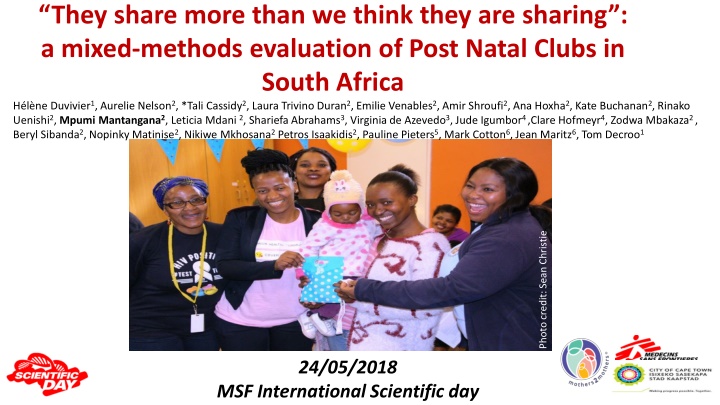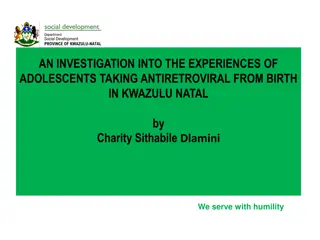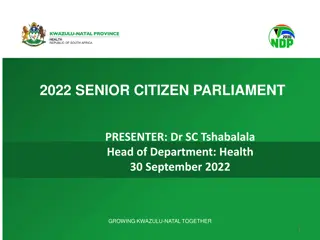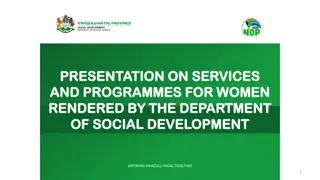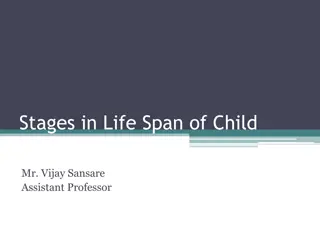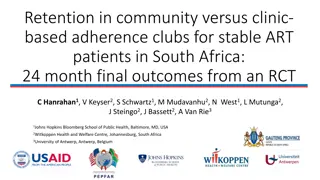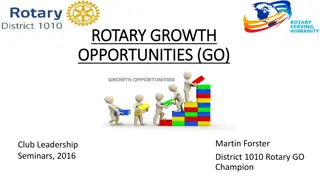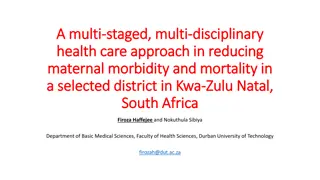Mixed-Methods Evaluation of Post Natal Clubs in South Africa
A study in Khayelitsha, South Africa, evaluated the effectiveness of Post Natal Clubs in improving retention in care for HIV-exposed infants. The study focused on peer support sessions, integration of maternal and child health, and postnatal care methodologies. Results showed high completion and viral load suppression rates, highlighting the potential of such clubs in improving health outcomes.
Download Presentation

Please find below an Image/Link to download the presentation.
The content on the website is provided AS IS for your information and personal use only. It may not be sold, licensed, or shared on other websites without obtaining consent from the author.If you encounter any issues during the download, it is possible that the publisher has removed the file from their server.
You are allowed to download the files provided on this website for personal or commercial use, subject to the condition that they are used lawfully. All files are the property of their respective owners.
The content on the website is provided AS IS for your information and personal use only. It may not be sold, licensed, or shared on other websites without obtaining consent from the author.
E N D
Presentation Transcript
They share more than we think they are sharing: a mixed-methods evaluation of Post Natal Clubs in South Africa H l neDuvivier1, Aurelie Nelson2, *Tali Cassidy2, Laura Trivino Duran2, Emilie Venables2, Amir Shroufi2, Ana Hoxha2, Kate Buchanan2, Rinako Uenishi2, Mpumi Mantangana2, Leticia Mdani 2, Shariefa Abrahams3, Virginia de Azevedo3, Jude Igumbor4 ,Clare Hofmeyr4, Zodwa Mbakaza2 , Beryl Sibanda2, Nopinky Matinise2, Nikiwe Mkhosana2Petros Isaakidis2, Pauline Pieters5, Mark Cotton6, Jean Maritz6, Tom Decroo1 Photo credit: Sean Christie 24/05/2018 MSF International Scientific day
Setting Khayelitsha: peri-urban, informal settlement Population ~ 500,000, 12 Health Centres HIV antenatal prevalence: 34% (2012) MTCT: 0.8% at 10 weeks (2015), unknown at 18m Town 2 clinic: 203 PMTCT babies in care a year Photo credit: Sam Reinders
Background: VEID study All HIV- exposed infants (n=781) born between Nov 2014-July 2016 in one primary care clinic who had birth PCR (some on Alere Q POC) Infants followed through the standard of care testing cascade If didn t test, traced (2 phone calls +- home visit) At 18 months: just 25% of babies tested before tracing an additional 13% tested after tracing. =>Poor retention in care of mother and infants in the 18 months post natally, what solutions can we bring?
PNC-methodology 45 min session Peer support Facilitated by m2m mentors HIV and non HIV topics Include high risk and non high risk MIP Mental health Early childhood development Support BF Adapted Adult ART club Photo credit: Sean Christie 1000 days Photo credit: Sean Christie Integration of maternal and child health Integration of HIV and non HIV care Mother: HIV, FP, Pap smear, MH, other Child: PMTCT, weight, EPI, vit A, Deworm, NDV, IMCI One stop shop Clinical visit at every session Postnatal nurse, NIMART 18 mths 15 mths 9 mths 12 mths 10 wks 18 wks 14 wks 6 mths 22 wks 6 wks CC Recruit PNC PNC PNC PNC PNC PNC PNC PNC PNC
Results- from July 2016 until March 2018 (n=296 mothers) Proportion of mother infant pairs experiencing an outcome at each time point.* 100% Postnatal Club VL completion & suppression 96% VL suppression 96% VL completion at 18 months 82% RIC at 18 months 99% 96% 93% 92% 90% 250 100% 96% 96% 80% 94% 70% 92% LTFU BTC DNA attended 200 80% 60% Number due 50% 40% 150 60% complete 30% 20% suppressed 100 40% 10% 0% % complete 50 20% 6 month N=230 TFO=3 9 month N=191 TFO=6 12 month N=155 TFO=9 15 month N=109 TFO=11 18 month N=82 TFO=11 % suppressed 0 0% *Denominator at each point is those with enough follow-up time week 10 month 6 month 12 month 18 Infant rapid test uptake Positive Infant vaccination coverage* 9 months 157/159 (99%) 0 12 months 104/123 (84.5%) 18 months 62/67 (93%) 0 *as recorded in register Note: not all MIPs have been in care the same amount of time, hence the different N at each time point. For example, only 82 moms started more than 18 months ago, but 230 started more than 6 months ago
Knowledge acquired in PNCs Adherence I was educated about the importance of breastfeeding a baby Infant feeding and healthy diet for mothers and babies Before a child is tested, you receive counselling. All of us we would talk about the test that is going to be done on the baby Follow-up tests and treatment for babies Early childhood development activities
Peer support generated by PNCs Dynamic: They started not knowing each other, but now they are friends PNC related outputs: Relationships Community support and knowledge transmission Family support Disclosure Advice Stigma reduction Role models We learned to share in the Club. If one of you doesn t have, you provide They give the clear understanding of HIV and the ability of sharing it at home
Influence of PNCs on behaviour Health behaviour: PNC participants adapt their behaviour based on advice they receive in PNCs. PNCs helped me to monitor my health and my baby s health Motherhood: PNC participants said they gained reassurance about their ability to breastfeed and care for their baby. "Now, I know that a baby can hear. So I must speak to my baby and I must play with him
Advantages of PNCs Sharing experiences Time saving Comprehensive care Staff attitude and setting Patients follow up and data collection Health education Mental health assessment and support Health outcome improvements Assistance to other participants We are taken care of, with my child at the same time, and the care they portray is excellent They know exactly when the child is due for their blood test, their results, their immunizations
Challenges related to PNCs If you d used clinic staff, it would not have been the same because clinic staff cannot sit 8 hours doing 10 mothers and infant pairs there Space and confidentiality issues Length of the sessions HR and workload issues Quality versus quantity PNC meetings dates Sustainability Graduation I wish it can always be like this and we do not graduate at a certain stage. I wish we are not removed and always be in, even if our kids are old we can stay in
Other challenges identified ->working on solutions Complex preparation of PNC: scheduling of clubs, scripting, recruitment by two weeks of age Space and time limitation for clubs to take place Some clubs too small/other clubs too large High risk mothers : taking a lot of time and outcome not really improved Perceived increased length of visit Lengthy stationery that we have tried to shorten Need experienced nurse: -NIMARTed -skilled in maternal and child health
Conclusion PMTCT post natal retention in care of mother infant pairs remains a problem The PNC model offers a comprehensive integrated package of care to mother-infant pairs and improve health outcomes The model generates knowledge and triggers positive changes in health behaviours and motherhood PNCs generate great peer support Participants and staff show a high level of satisfaction with the model despite some operational challenges The PNC model highlights the absolute necessity to consult mother-infant as a pair and proposes high level of care requiring acceptance for reorganisation and training of clinic staffs.
Acknowledgements Thank you to the rest of the team for their unconditional support and conviction into this project: - the MSF team - the mothers2mothers mentors (Nobuntu Ma-Awu, Bonelwa, Nokhuthula, ) - the clinic staff (Sr Zide, M.Mani, Sr Letsoma , Sr Bonanto, Ziyaad Isaacs, Regina Gioio, Yandi) - all the mothers and infants part of the PNC We confirm that we have obtained permission to use images from the participants included in this presentation For more info, you can contact Helene Duviviers lnduv@hotmail.com Or Aurelie Nelson on MSFOCB-Khayelitsha-EID@brussels.msf.org
Babies born 1 Nov 2014- 30 June 2016: 781 Positive birth PCR: 4 6/10 Weeks 6/10 Weeks Tracing successful: 110 (59%) Tested before tracing: 592 (78%) 17 TFO Total Tested: 670 (88%) [5-15 weeks] Positive 5 1 RIP Number due: 759 Tested after tracing 78 (71%) Tracing attempted: 185 4 positive in between testing periods 9 Months 9 Months 25 TFO Tracing successful: 226 (53%) Tested before tracing: 291 (40%) 4 RIP Positive 4 Total Tested: 420 (58%) Number due: 721 Tested after tracing 129 (57%) Tracing attempted: 424 18 Months 18 Months Tracing successful: 124 (42%) 95 TFO Tested before tracing: 136 (25%) Tracing attempted: 297 5 RIP Positive 2 Total Tested: 206 (38%) Tested after tracing 70 (56%) Number due*: 539 *18 months data collection ongoing, allowing a window period of 3 months for the test to be completed and data to be captured
